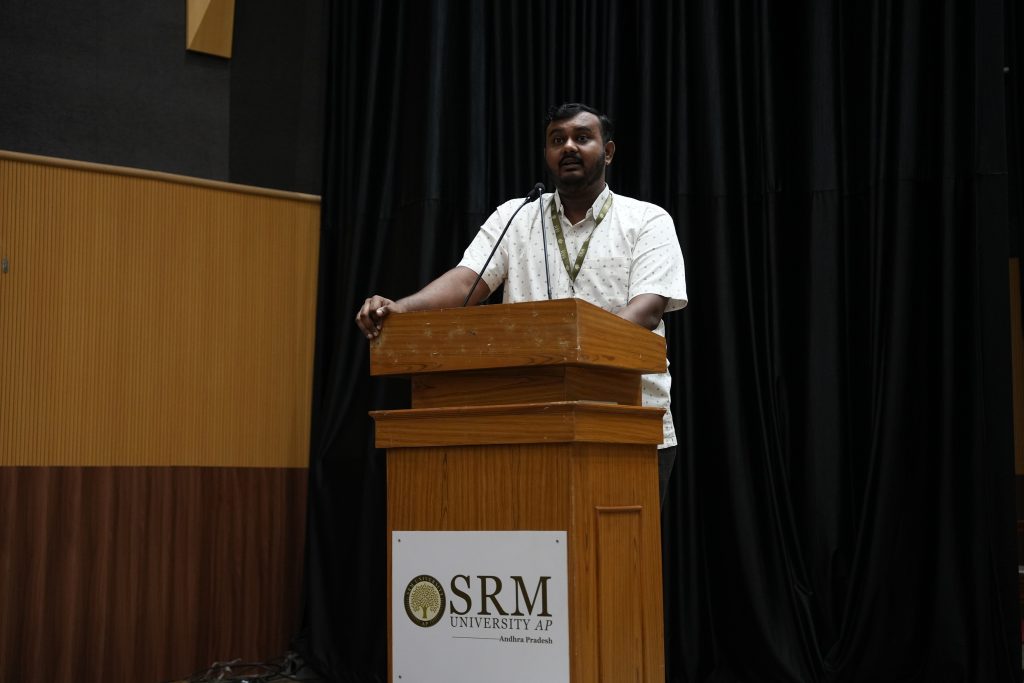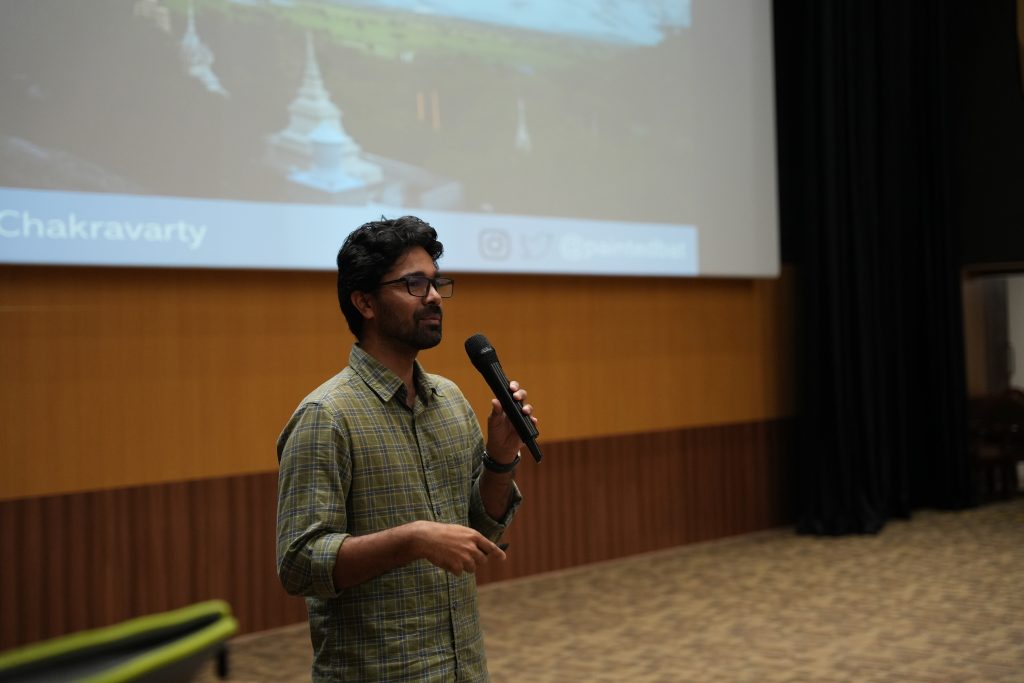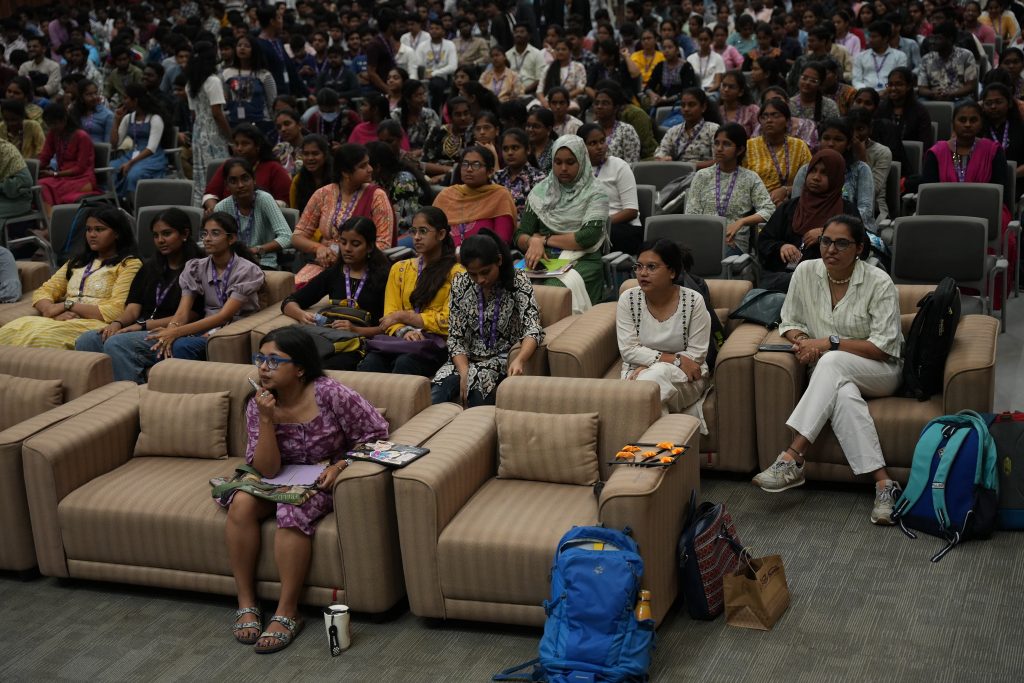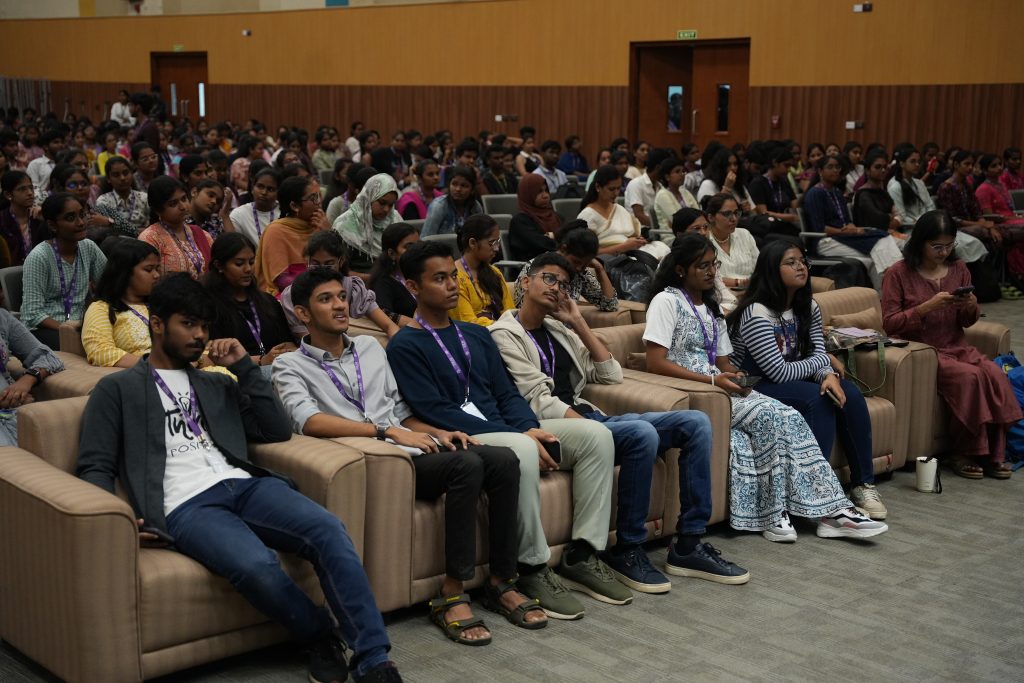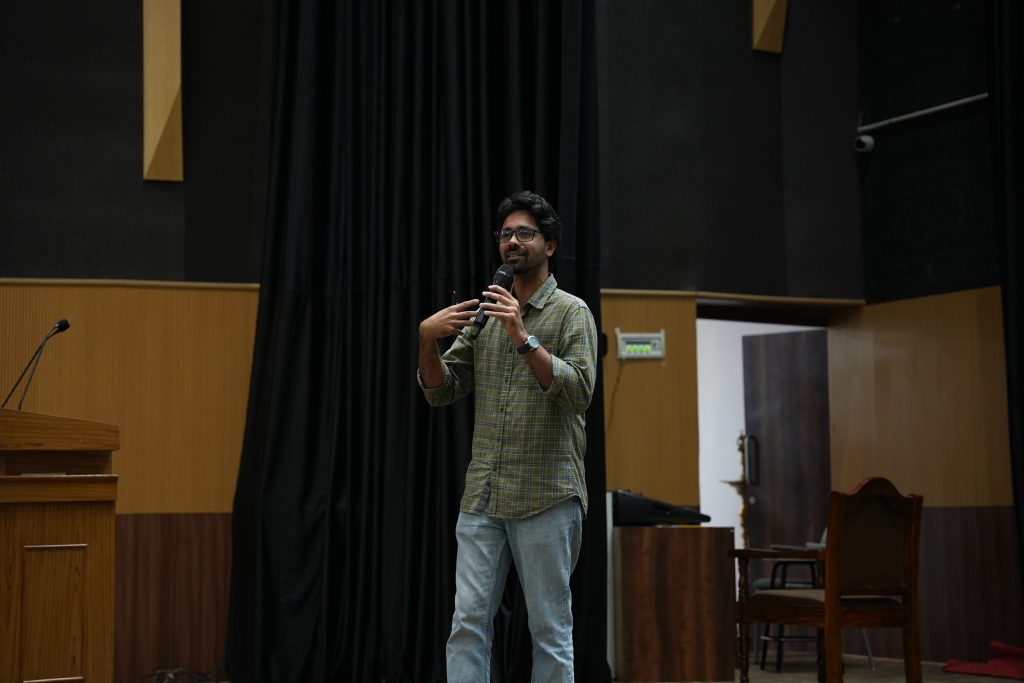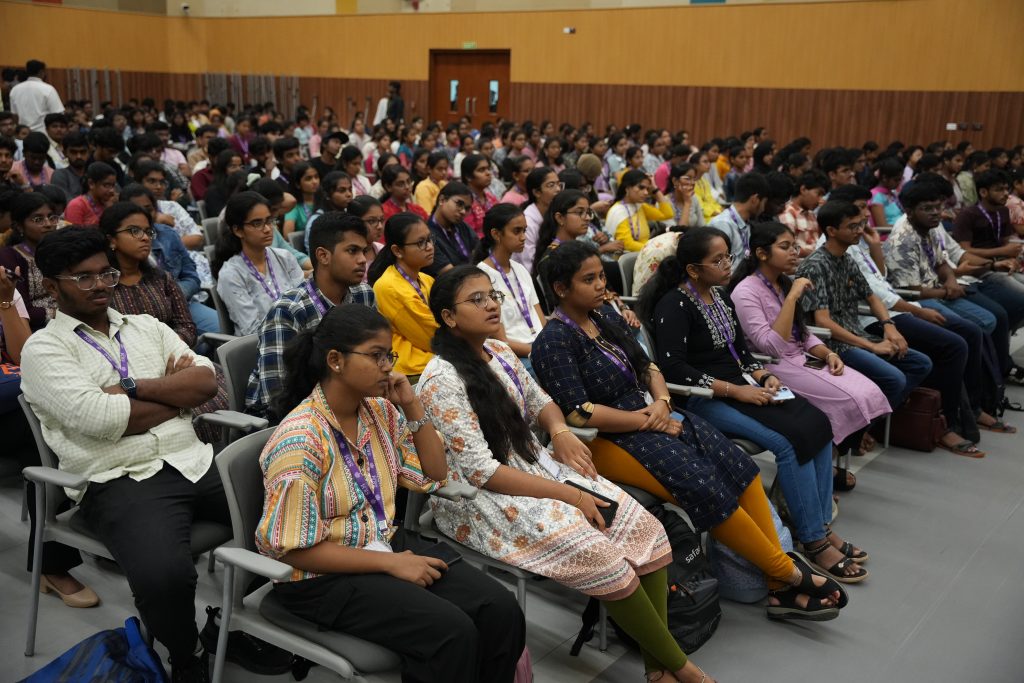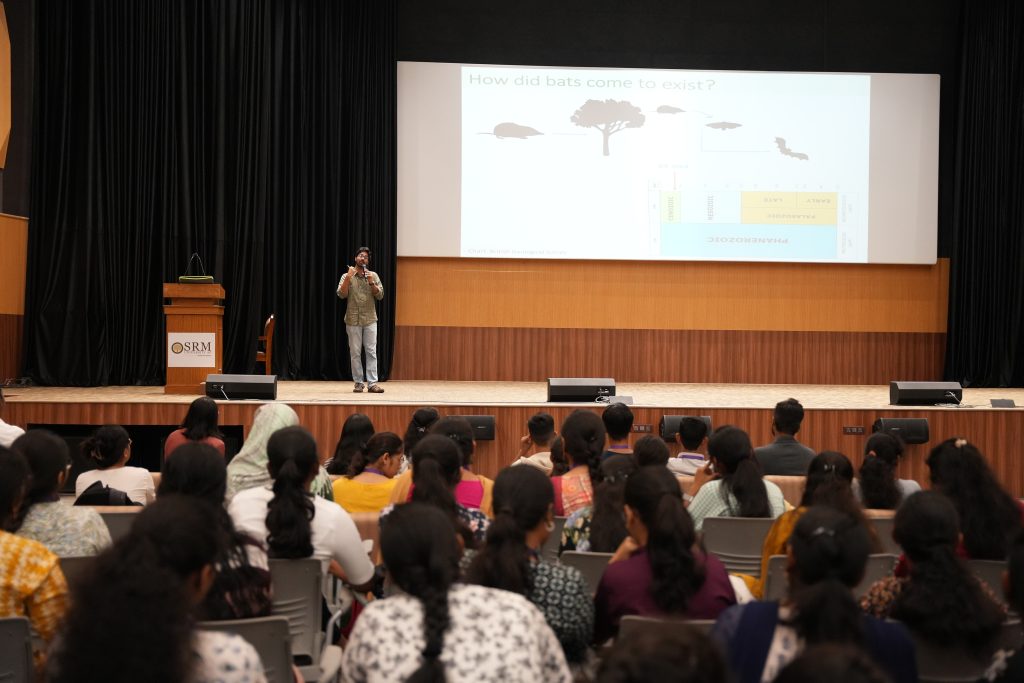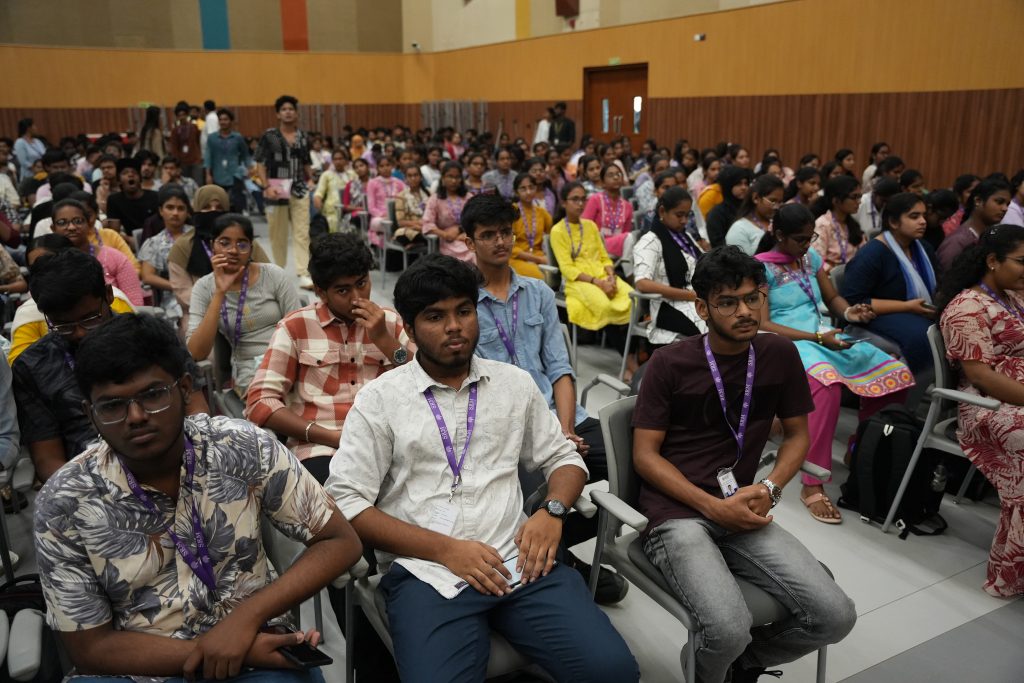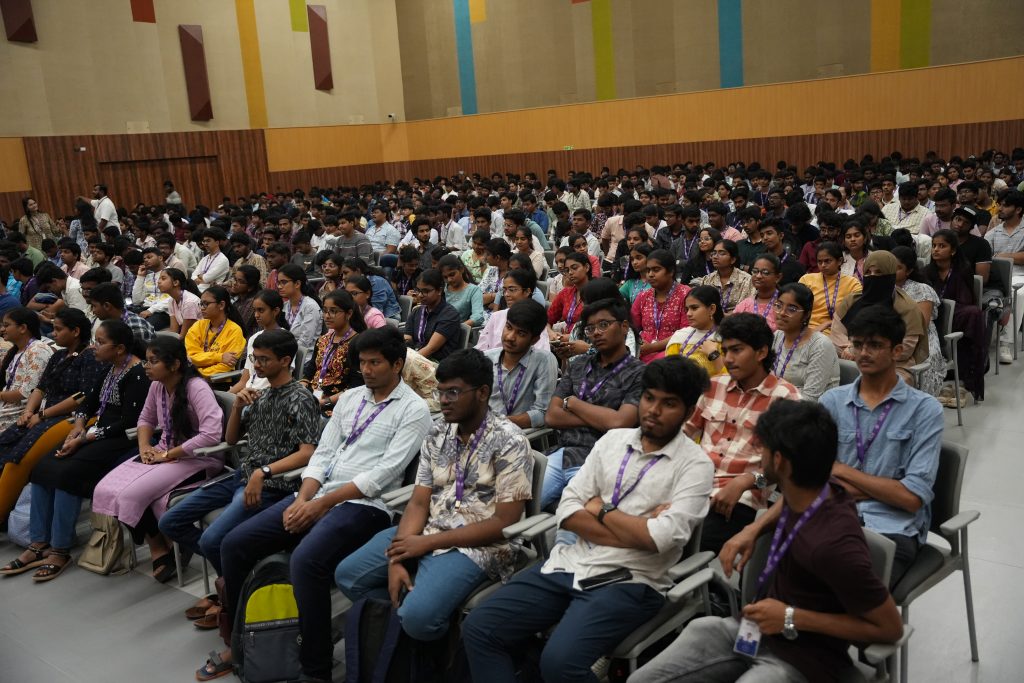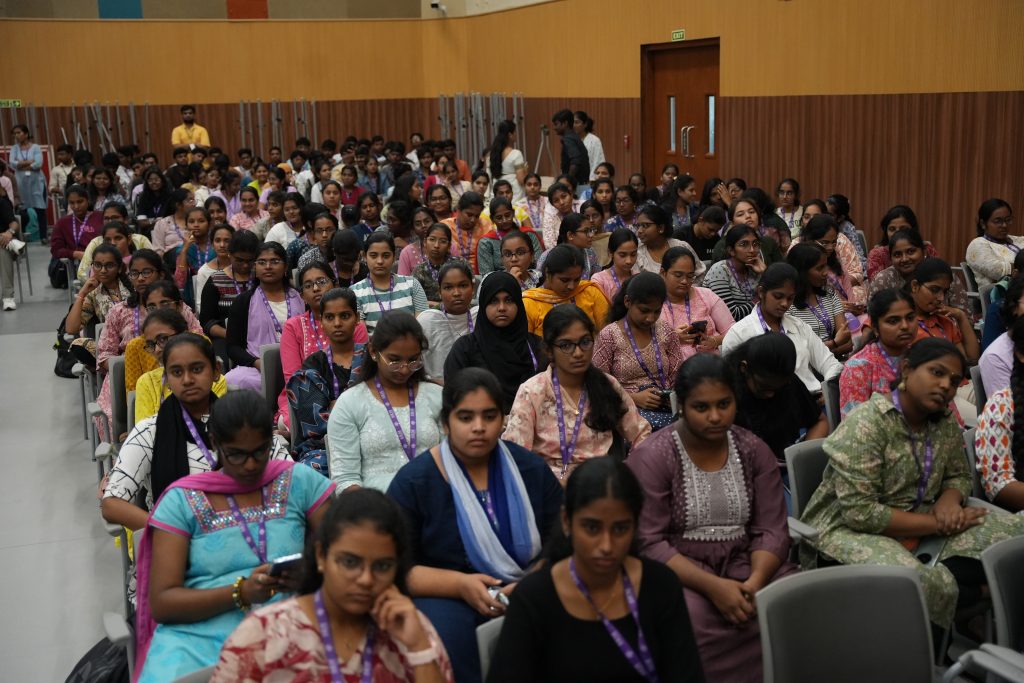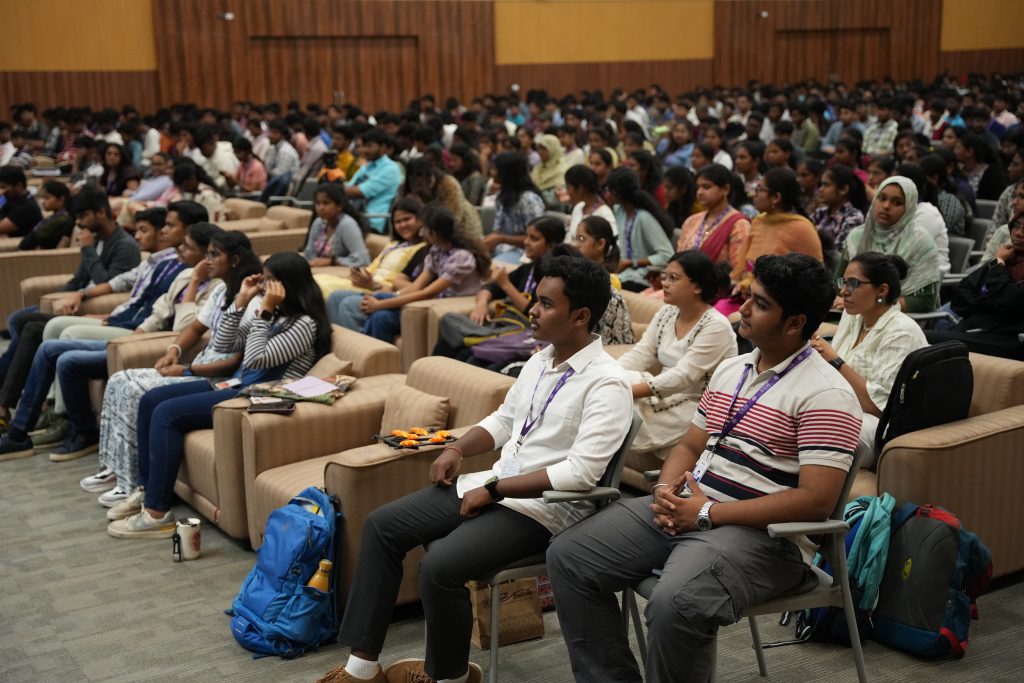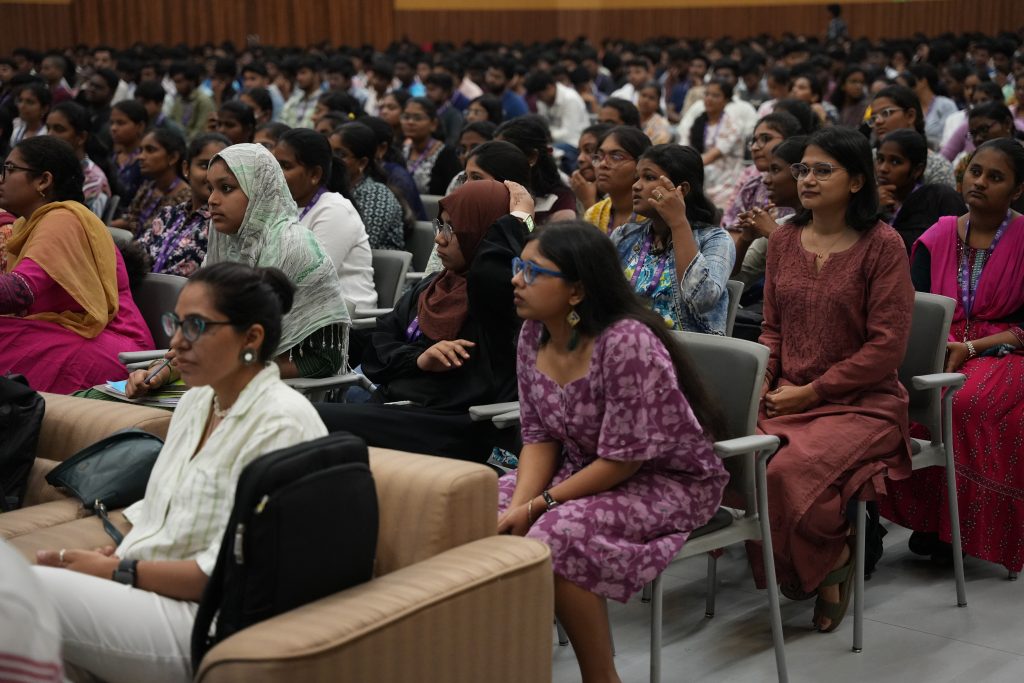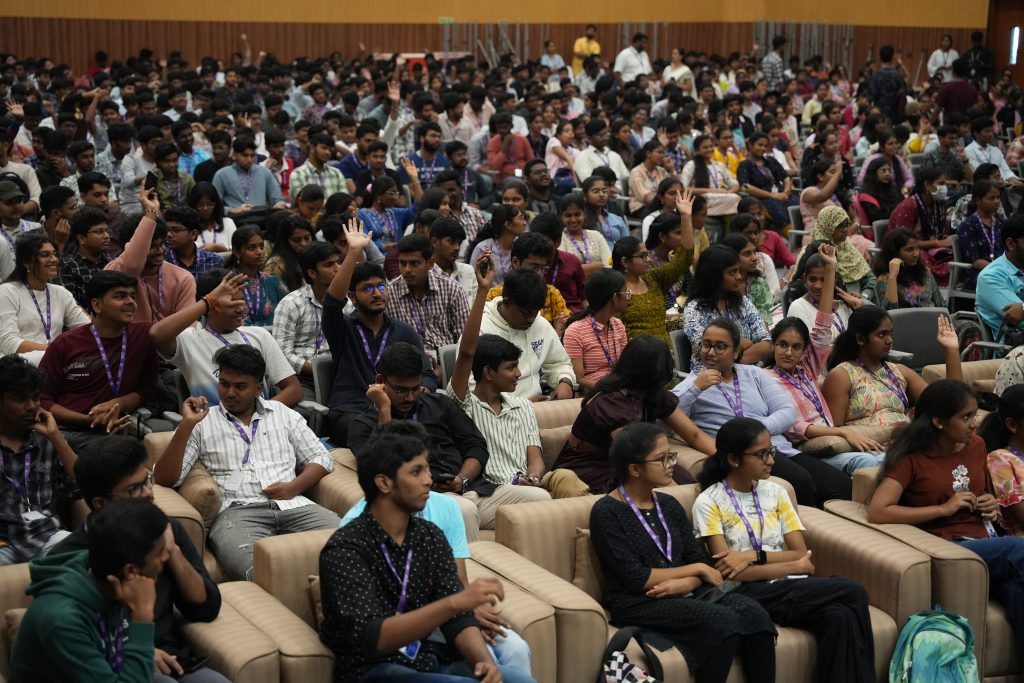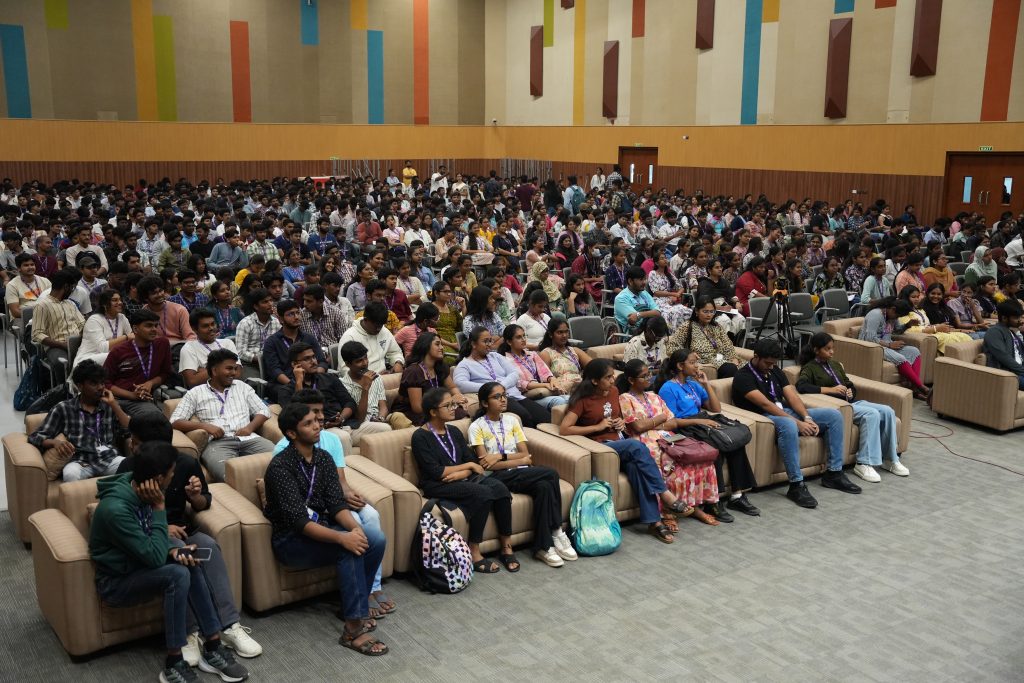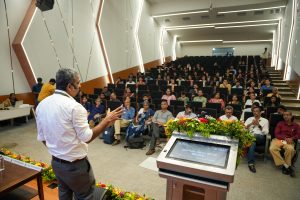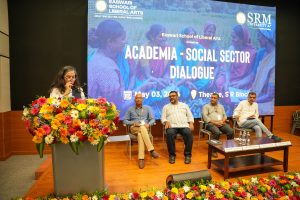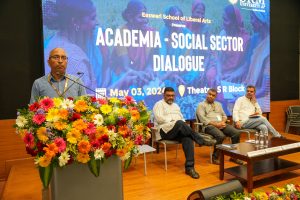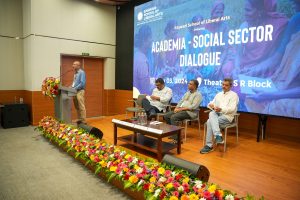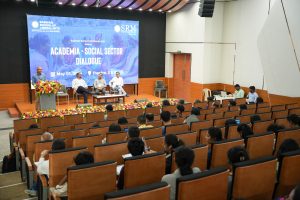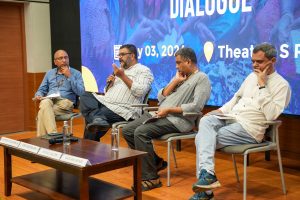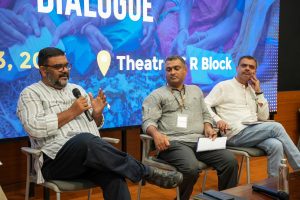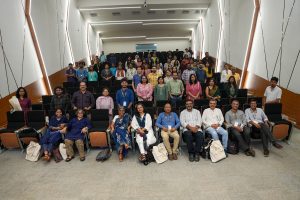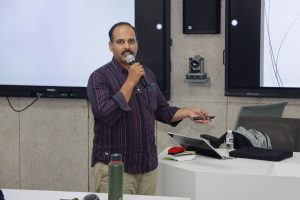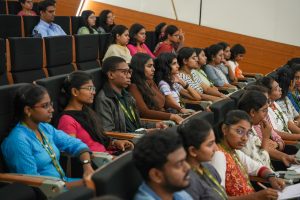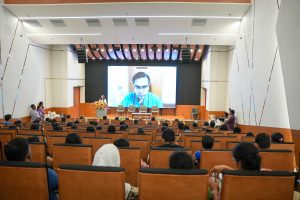- A Session on Interspecies Living and Bio-acoustics by Rohit Chakravarty November 18, 2024
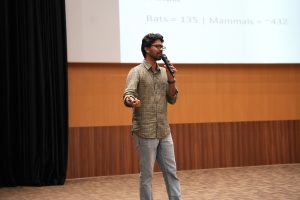
The Department of Sociology and Anthropology under the aegis of Easwari School of Liberal Arts at SRM University-AP hosted a thought-provoking session on November 07, 2024. The session unravelled a fascinating world of interspecies living and highlighted the vital yet often ignored role of bats in our ecosystem. Mr Rohit Chakravarthy, a bat researcher working with Nature Conservation Foundation and Bat Conservation International was the speaker for the session.
The session for the students of Universal Human Values and Ethics focused on inter species living and inclusivity, although misunderstood and feared, bats play a critical role in contributing to the agriculture and beverages industries. The session also revealed that bats are primary pollinators for Durian fruit and tequila, two products that owe their existence to these nocturnal creatures. The session witnessed many such interesting stories that helped to portray bats as less frightening creatures.
However, it wasn’t just science and industry on the agenda. The session brought to life the fascinating social structures within bat colonies and captivating stories of bats sharing food with those in need and even acting as midwives, assisting other bats during childbirth! These behaviours reflect values of care and community that humans can learn from—reminders of how interconnected life on Earth truly is!
The session also acknowledged their association with the deadly viruses such as SARS, COVID-19, and Nipah. As the session drew to a close, students walked away with more than just facts. They left with a renewed appreciation for the world around them.
The second session, directed at Open Elective students studying the Socio-Cultural Dimensions of Sound, dove into the incredible world of bio-acoustics. The lecture explored echolocation used by bats as an important indicator for the military infrastructure for improving sonar technology used in submarines. Students were fascinated by the intricacies of interspecies communication, as bats use sound not only for navigation but also to exchange crucial information about habitat, mating, and potential threats.
The lectures beautifully combined science, ethics, and socio-cultural insights, reflecting the Department’s mission to nurture holistic thinkers and foster interdisciplinary learning. Although unconventional, the talk seemed to open new and diverse avenues for Liberal arts students, inspiring them to walk newer and less trodden paths.
Continue reading → - Examining Karnataka’s Mandate for Signboards: Paper by Dr Vineeth Thomas May 30, 2024
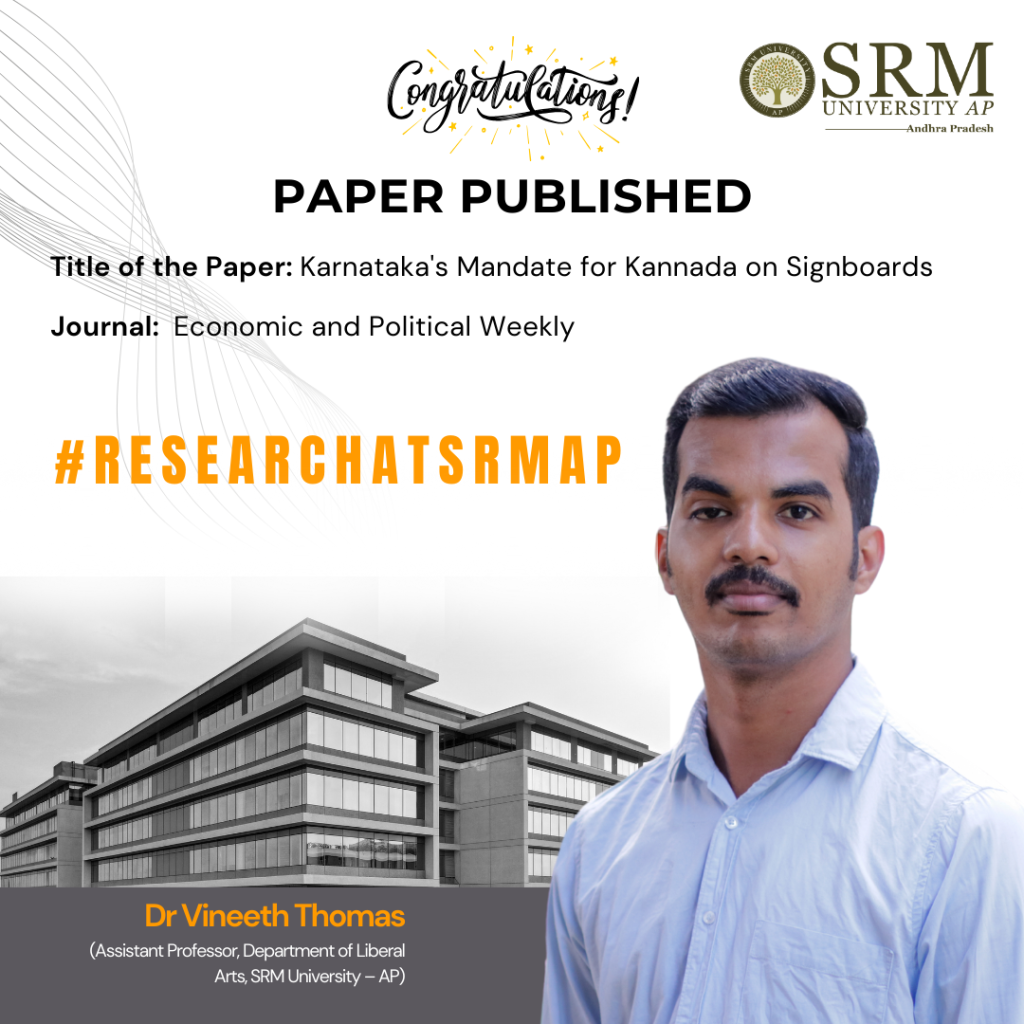
In a research paper published in Economic and Political Weekly, Dr Vineeth Thomas, an Assistant Professor at the Department of Liberal Arts, delves into the socio-political and economic implications of the “Karnataka’s Mandate for Kannada on Signboards” amendment. The article highlights the social and cultural significance of the amendment and raises awareness about the potential economic challenges it may pose. This insightful paper not only makes for an engaging read but also serves as a valuable resource for policymakers and politicians, bringing attention to the practical and social implications of the amendment.
Abstract
The Kannada Language Comprehensive Development (Amendment) Bill, 2024, ratified by the Karnataka Legislative Assembly and Legislative Council, stands as a legislative landmark with profound implications. This commentary critically analyses the socio-economic-political implications, unravelling the intricate web of influences that the Kannada Language Comprehensive Development Bill introduces within the diverse and dynamic landscape of Karnataka.
Citation
Roshmi Antony, Vineeth Thomas, Lulubala Nayak (2024)-, Karnataka’s Mandate for Kannada on Signboards, Economic and Political Weekly, ISSN (Online) – 2349-8846 (SCOPUS /ABDC Indexed)
Continue reading → - Easwari School of Liberal Arts Facilitates Transformative Academia-Social Sector Dialogue May 6, 2024
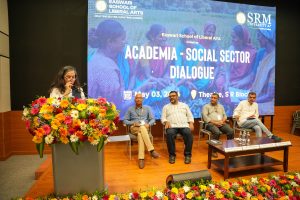 The Easwari School of Liberal Arts hosted the highly anticipated “Academia-Social Sector Dialogue” event, aiming to foster collaboration between academia and the social sector. The event brought together experts, social actors, scholars, practitioners, and students to engage in insightful discussions about the intersection of education and social sector development.
The Easwari School of Liberal Arts hosted the highly anticipated “Academia-Social Sector Dialogue” event, aiming to foster collaboration between academia and the social sector. The event brought together experts, social actors, scholars, practitioners, and students to engage in insightful discussions about the intersection of education and social sector development.The event, convened by Prof. Vandana Swami, brought together a distinguished array of social sector leaders, Academicians from various states across India, deans, faculties, and students. It was a day of enlightening discussions and knowledge exchange, aiming to bridge the gap between academia and the social sector.
At the heart of this dialogue was a commitment to nurturing well-rounded, socially conscious leaders of tomorrow. The event provided a platform for students to engage directly with eminent figures from the social sector, fostering a deeper understanding of real-world challenges and opportunities.
The dialogue saw participation from leading social actors, including Liby Johnson (Gram Vikas, Odisha), Ronak Shah (Seva Mandir, Udaipur), Nishant Aggarwal (Donyi Polo Cultural and Charitable Trust, Arunachal Pradesh), Swapna Sarangi (Foundation for Ecological Security, Odisha), Gayatri Menon (Independent Researcher, Public Health Foundation of India, Bengaluru and Academic luminaries, such as Suraj Jacob (Azim Premji University, Bengaluru) and Manu Mathai (World Resources Institute, Bengaluru) Yamini Aiyar, Former President, Center for Policy Research, New Delhi, added depth to the dialogue, offering nuanced perspectives on the intersection of academia and the social sector.
Prof. Vishnupad, Dean of Easwari School of Liberal Arts, expressed his satisfaction with the event’s outcomes, stating, “We are delighted to have facilitated this enriching exchange between academia and the social sector. The discussions were not only insightful but also generative, paving the way for potential future collaborations between students and social sector organisations that can bring about positive change in the society.”
A highlight of the event was the keynote speech by Amitabh Behar, Global Executive Director of OXFAM. Behar’s insights sparked discussions among attendees, leading to reflection and action-oriented dialogue on caste, gender, and economic inequality. This prompted introspection and dialogue on the responsibilities of civil society in addressing these urgent issues.
The event featured thought-provoking panel discussions on two key themes: “Social Sector and the Indian State: Challenges and Opportunities” and “Role of Social Sector in Liberal Arts Education.” Panellists deliberated on the complexities and possibilities within the social sector, exploring ways to address challenges and leverage opportunities for societal progress. The dialogue was not only engaging but also fruitful, laying the groundwork for potential collaborative efforts in the future.
Furthermore, discussions on the Easwari School of Liberal Arts Summer Immersion Programme underscored the institution’s commitment to experiential learning and social impact.
Prof. Vandana Swami, Professor, Easwari School of Liberal Arts remarked, “Academia-Social Sector Dialogue epitomises SRM University-AP’s ethos of excellence, innovation, and social responsibility. It serves as a testament to the university’s unwavering dedication to shaping future leaders who are not only academically proficient but also socially conscious and empathetic global citizens”.
Continue reading → - Exploring Contemporary Narratives in New Media April 25, 2024
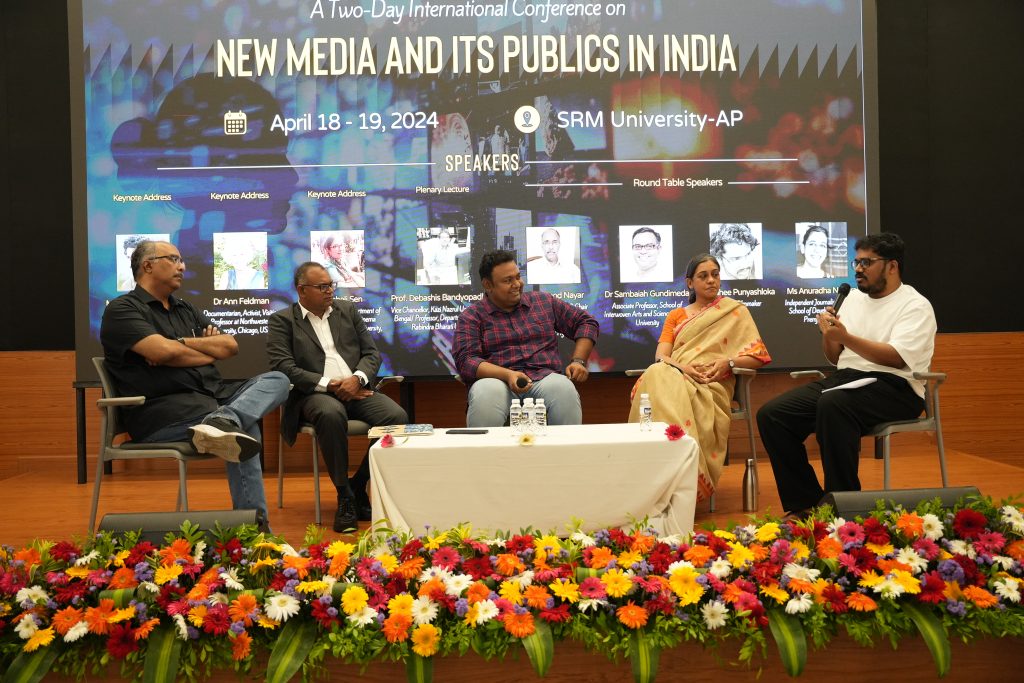
Department of Liberal Arts and the Department of Media Studies, under the aegis of the Easwari School of Liberal Arts at SRM University-AP organised its 2-day International Conference on New Media and its Publics in India. This prestigious conference welcomed renowned figures, including Mr Abhinandan Sekhri, co-founder and CEO of Newslaundry; Dr Ann Feldman, Documentarian and Activist; Dr Meheli Sen, Associate Professor, Department of AMESALL, Director of Cinema Studies Program, Rutgers University; Dr Pramod K Nayar, Professor and UNESCO Chair in Vulnerability Studies, Department of English, University of Hyderabad; Dr Sambaiah Gundimeda, Associate Professor, School of Interwoven Arts and Sciences, KREA University; Mr Rahee Punyashloka, Artist and Filmmaker and Ms Anuradha Nagaraj, Independent Journalist, Faculty at School of Development, Azim Premji University.
In his inaugural address, Vice Chancellor Prof. Manoj K Arora remarked, “We are honoured to host a conference of this magnitude. Media has become an indispensable facet of our contemporary existence; invariably, we all engage with or subscribe to media in some capacity.” Keynote speaker and co-founder of Newslaundry, Mr Abhinandan Sekhri, imparted his wisdom to the attendees, emphasising, “As the fourth pillar, media plays a pivotal role in society. It is imperative that we discern and uphold the principles of authentic journalism.” Prof. Vishnupad, Dean-Easwari School of Liberal Arts, remarked,” Technology and media have become an essential aspect of our lives today, and they have drastically altered our perception of things.”
Dr Meheli Sen, Dr Ann Feldman, Dr Pramod Nayar, Dr Sambaiah Gundimeda, Mr Rahee Punyashloka, and Ms Anuradha Nagarajan all deliberated on the various possibilities and interpretations that the New media offers and thereby shapes the public narratives. The conference also comprised a series of parallel sessions that explored the multifaceted relationship between New Media and various disciplines. Topics discussed included New Media and Literature, Gender, History, Democracy and Performance. Members of the academia presented their research papers, fostering insightful discussions on the evolving landscape of New Media.
The two-day event witnessed 150+ entries from students, scholars and faculties from across the country and the world and provided a platform for intellectual exchange but also fostered a collaborative spirit among participants. The conference concluded with a plenary address by Dr Pramod Nayar, which served as a catalyst for innovative thinking in New Media. Registrar Dr R Premkumar, in his message, applauded the efforts of the convenors, Dr Asijit Dutta and co-convenors Dr Sapna Mishra and Dr Partha Bhattacharjee for organising a scholarly colloquium such as this and remarked, “the exchange of ideas, scholarly debates, and interdisciplinary discussions that transpired here will undoubtedly enrich the academic landscape and advancement in the field of new media”.
Continue reading →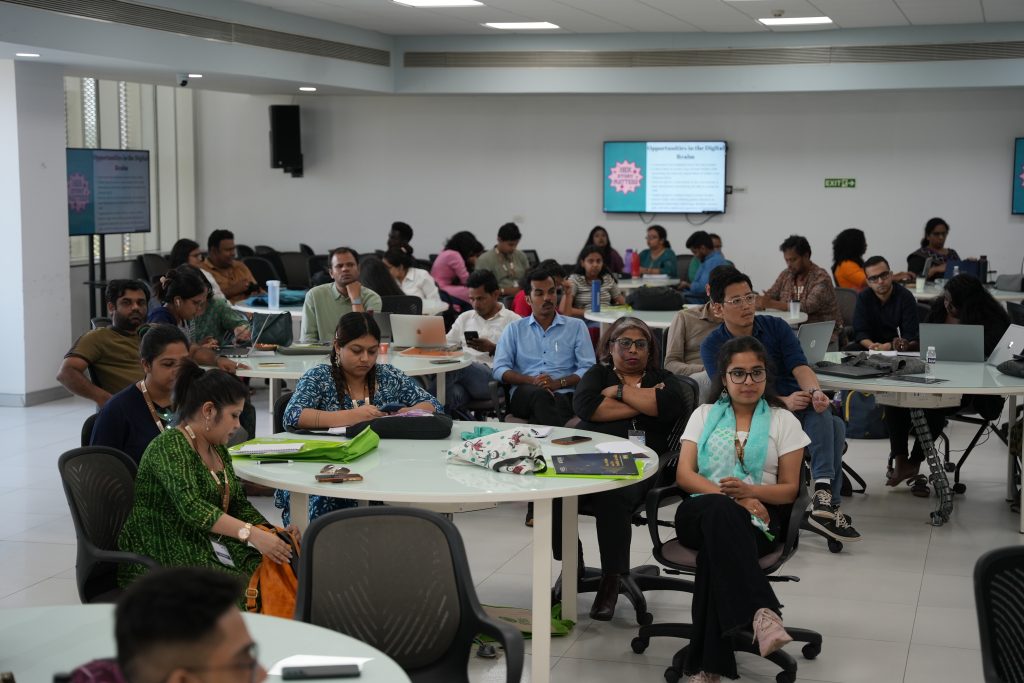
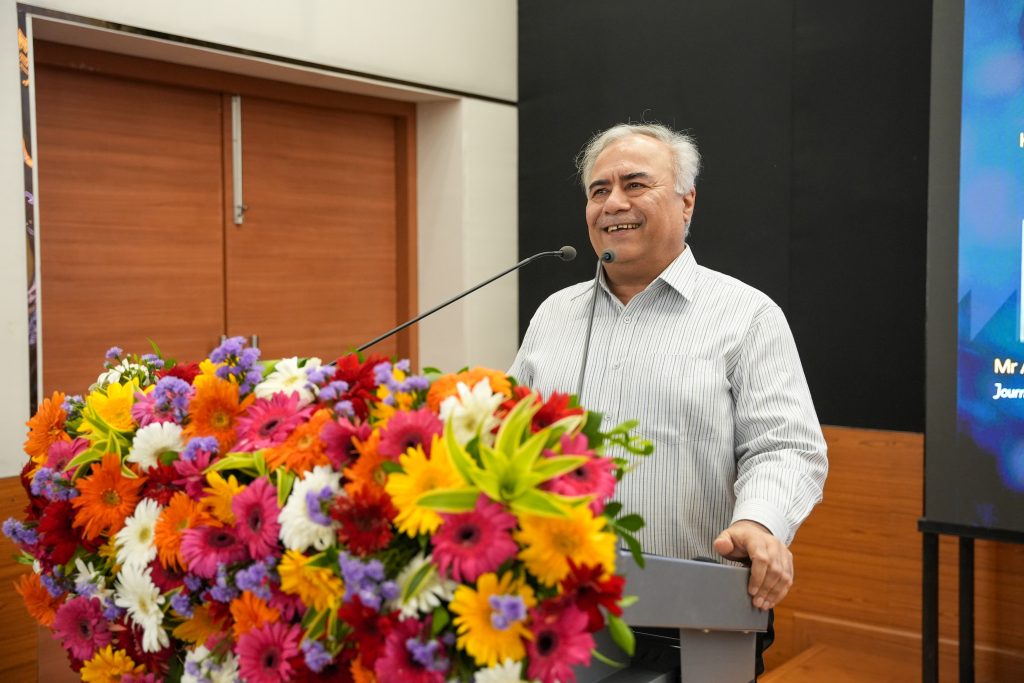
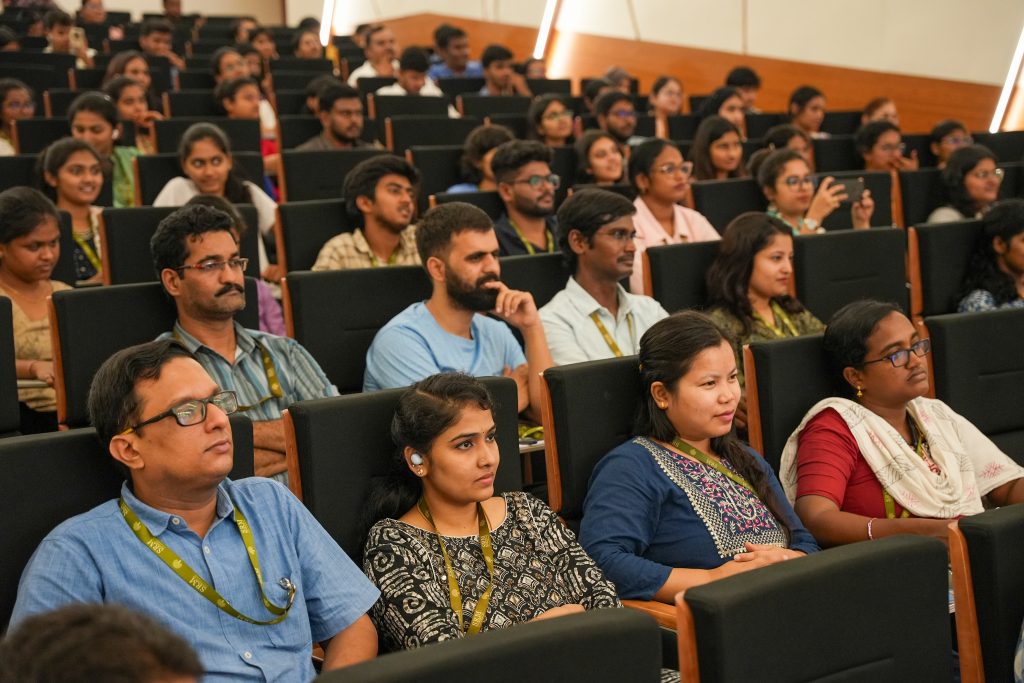
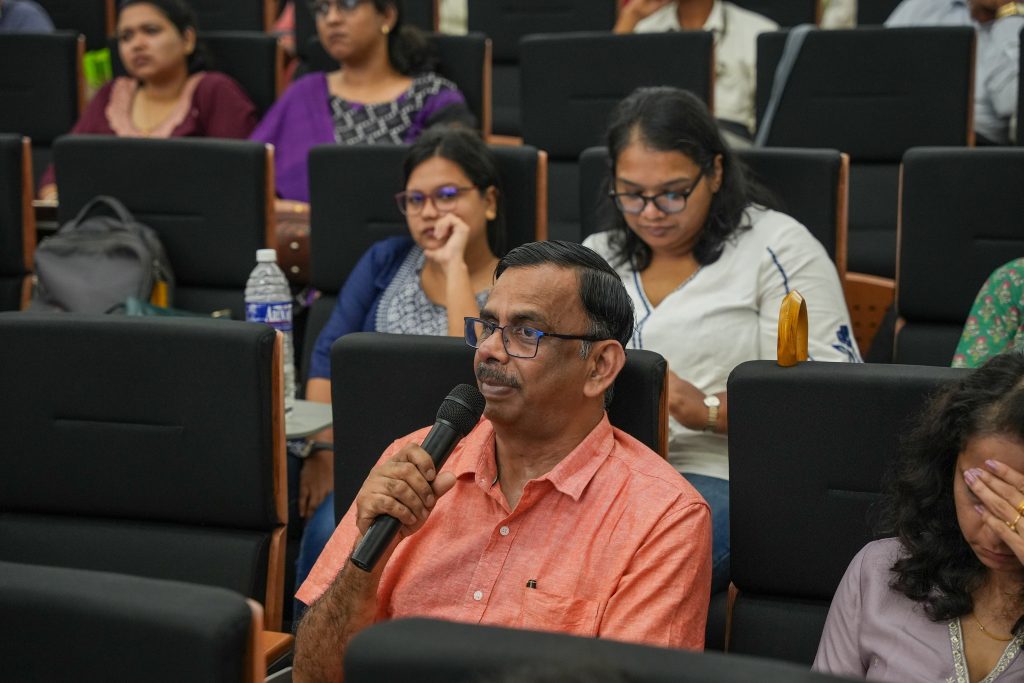
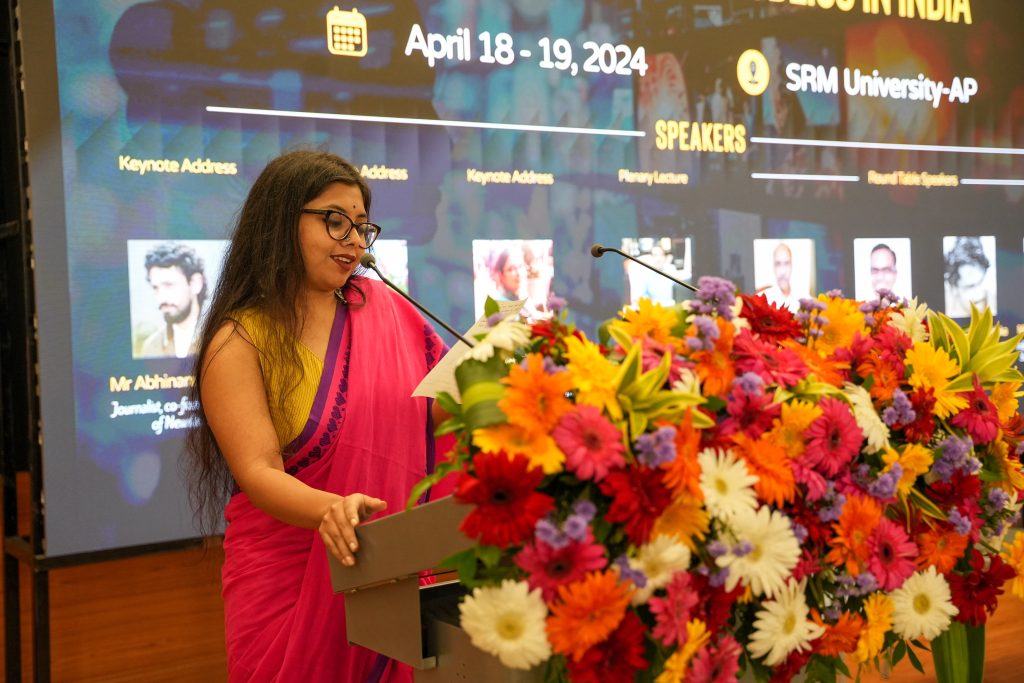
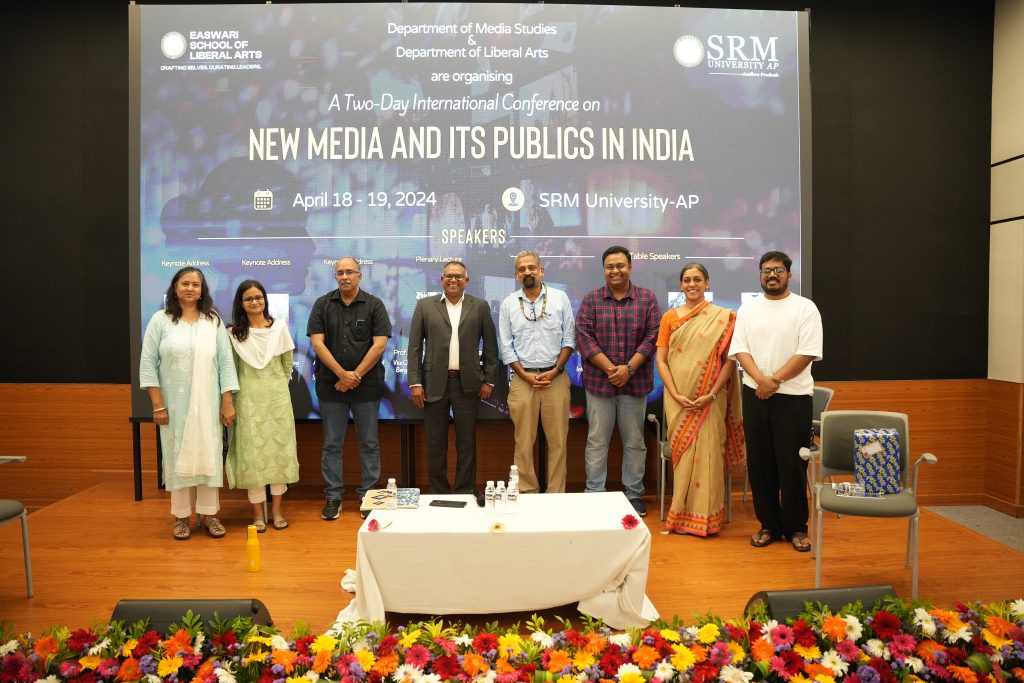
- Advocating for Change: Shedding Light on the Struggle of Acid Attack Survivors February 29, 2024
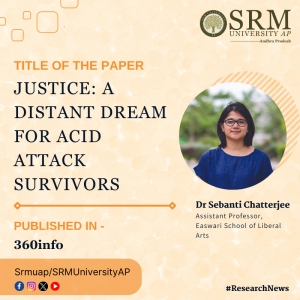 In a thought-provoking paper titled “Justice A Distant Dream for Acid Attack Survivors,” published in 360 Info, Dr Sebanti Chatterjee, Assistant Professor in the Department of Liberal Arts, delves deep into the persistent challenges faced by acid attack survivors.
In a thought-provoking paper titled “Justice A Distant Dream for Acid Attack Survivors,” published in 360 Info, Dr Sebanti Chatterjee, Assistant Professor in the Department of Liberal Arts, delves deep into the persistent challenges faced by acid attack survivors.Despite the existence of legal provisions aimed at addressing gender-based violence, the harrowing reality is that acid attacks continue to be a stark and under-addressed form of violence. Dr Chatterjee’s paper sheds light on this critical issue, highlighting the urgent need for greater awareness, support, and legal reform to provide justice and support for survivors.
Through her research, she underscores the importance of recognising and prioritising the plight of acid attack survivors, urging for collective action to create meaningful change. As advocates for social justice, it is imperative that we amplify their voices and work towards a future where justice is not a distant dream but a tangible reality for all survivors.
Abstract
Acid attacks can occur in private or public. These attacks are often rooted in ‘jilted lover’ syndrome or as a manifestation of continued domestic violence. Few cases offer a different narrative: one woman was attacked to teach her father a lesson about property disputes. Ultimately, the acid attack is yet another demonstration of patriarchy’s brutishness.
My (unpublished) research in 2021 with acid attack survivors (including Rima), lawyers, police and other stakeholders in West Bengal — as part of a collaboration between National Human Rights Commission and National Law School of India University, Bangalore — found that despite these various legal advances, acid attack as a form of violence is not prioritised as an issue needing immediate attention, unlike rape and child trafficking.DOI: 10.54377/e719-077c
Future Research Plan
To explore how a state cultural heritage status makes us explore the social life of an instrument- it’s secular and sacred manifestations, questions of labour, gender and the sustainability model pertinent to its musical and material interpretations.
Topic of research
Soulful beats: Ecology, Labour and Aesthetics of Ghumott
Continue reading →


